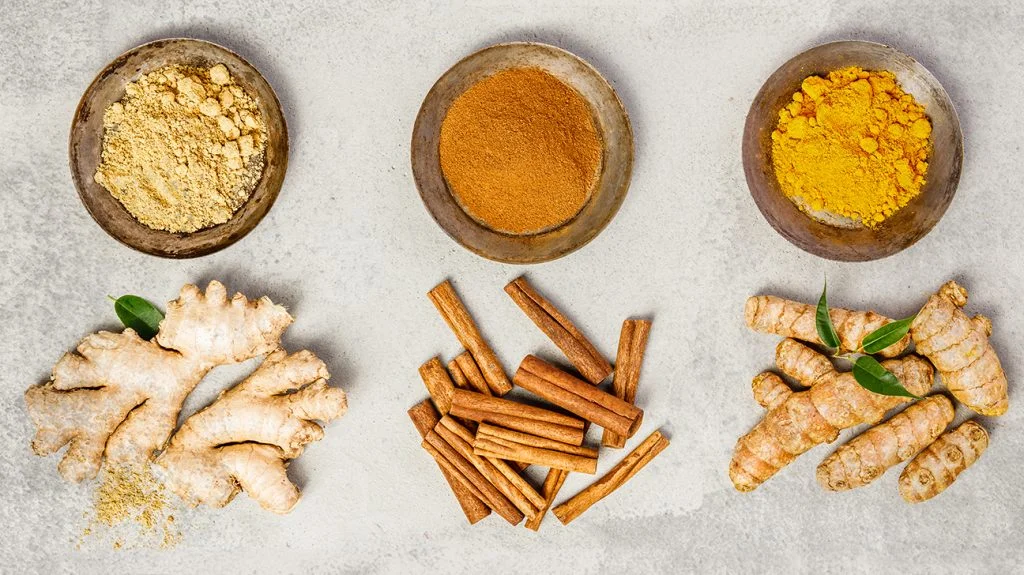Good digestion is essential for overall health and well-being. While a balanced diet and regular exercise are important, certain herbs can also provide natural support for a healthy digestive system. In this guide, we will explore the top herbs for digestive health benefits and how they can help with common digestive issues such as bloating, indigestion, and nausea. These herbs are easy to incorporate into your daily routine, offering you natural remedies for digestive wellness.

1. Ginger For Better Digestion and Nausea Relief
To begin with, ginger is one of the most well-known herbs for improving digestion. Ginger root has anti-inflammatory and anti-nausea properties, making it particularly useful for easing stomach discomfort. It helps stimulate digestive enzymes and promotes the smooth passage of food through the digestive tract.
- Benefits of Ginger for Digestion: Relieves bloating, reduces nausea, promotes gastric emptying.
- How to Use Ginger: You can consume ginger in tea form, chew on a small piece of raw ginger, or add it to meals for a spicy, digestive-boosting kick.
Furthermore, ginger is known to calm nausea caused by motion sickness, morning sickness, or digestive disturbances.
2. Peppermint For Easing Indigestion and Gas
Also, peppermint is another herb that has long been used for digestive health. Peppermint contains menthol, which has soothing effects on the stomach and can help relax the muscles of the digestive tract. This can relieve symptoms such as bloating, indigestion, and gas.
- Benefits of Peppermint for Digestion: Helps relieve bloating, eases indigestion, reduces gas and cramps.
- How to Use Peppermint: Peppermint tea is a great way to soothe the stomach, or you can chew peppermint leaves or use peppermint oil in aromatherapy to relieve digestive discomfort.
In addition, peppermint is often used to treat irritable bowel syndrome (IBS) due to its ability to reduce bloating and cramping.
3. Fennel For Reducing Bloating and Gas
Additionally, fennel seeds are a powerful herb for digestive health, especially when it comes to reducing bloating and gas. Fennel contains compounds that help relax the muscles in the digestive tract, allowing gas to pass more easily and reducing discomfort.
- Benefits of Fennel for Digestion: Relieves bloating and indigestion, reduces gas, helps with constipation.
- How to Use Fennel: You can chew fennel seeds directly or make fennel tea by steeping the seeds in hot water.
Additionally, fennel is often used to soothe infant colic and digestive issues in babies due to its gentle, natural properties.
4. Chamomile For Soothing The Stomach
Furthermore, chamomile is a calming herb commonly used to relieve stress and promote sleep, but it also offers significant digestive benefits. Chamomile has anti-inflammatory and antispasmodic properties, making it effective in treating indigestion and soothing the stomach lining.
- Benefits of Chamomile for Digestion: Eases indigestion, relieves nausea, reduces bloating, promotes relaxation of the digestive muscles.
- How to Use Chamomile: The best way to use chamomile for digestion is in the form of tea. Drink a cup of chamomile tea after meals to help with digestion.
Moreover, chamomile can help relieve acid reflux and heartburn by calming the digestive tract.
5. Turmeric For Anti-Inflammatory Digestive Support
Turmeric is a potent herb known for its anti-inflammatory properties. The active compound in turmeric, curcumin, has been shown to support overall digestive health by reducing inflammation in the gut, which can help with conditions like irritable bowel syndrome (IBS) and inflammatory bowel disease (IBD).
- Benefits of Turmeric for Digestion: Reduces inflammation in the gut, improves bile production, supports overall digestive function.
- How to Use Turmeric: You can add turmeric to your meals, or drink turmeric tea. Mixing it with black pepper enhances its absorption and effectiveness.
Additionally, turmeric has liver-protective properties, which help in the detoxification process and overall digestion.
6. Licorice Root For Digestive Tract Healing
Furthermore, licorice root has been used for centuries as a remedy for digestive problems. Licorice contains glycyrrhizin, which can help protect the stomach lining and promote healing of the digestive tract, especially in cases of ulcers or gastritis.
- Benefits of Licorice Root for Digestion: Soothes and protects the stomach lining, reduces heartburn, promotes healing of ulcers.
- How to Use Licorice Root: Licorice tea is a popular way to consume it, but it’s important to use it in moderation due to its potential side effects when consumed in excess.
Moreover, licorice root can help reduce symptoms of acid reflux by soothing the esophagus and stomach.
7. Dandelion For Healthy Bile Production and Detox
Dandelion is a versatile herb that supports digestion by encouraging healthy bile production. Bile helps break down fats in the digestive system, and dandelion can improve its flow, making digestion smoother.
- Benefits of Dandelion for Digestion: Stimulates bile production, acts as a natural diuretic, promotes liver detox.
- How to Use Dandelion: Dandelion can be consumed as tea, or you can use the root in tinctures or capsules. The leaves can be eaten in salads.
Additionally, dandelion is beneficial for relieving constipation and supporting liver health, which indirectly aids digestion.
8. Aloe Vera For Soothing The Digestive System
Additionally, aloe vera is widely known for its skin benefits, but it also provides significant digestive health support. Aloe vera juice has soothing properties, which can help alleviate symptoms of heartburn, acid reflux, and constipation.
- Benefits of Aloe Vera for Digestion: Soothes inflammation in the stomach and intestines, supports regular bowel movements, reduces acid reflux.
- How to Use Aloe Vera: Aloe vera juice is the most common way to use it, but be sure to purchase products that are specifically labeled for internal use.
In addition, aloe vera may help detoxify the digestive tract and support gut health by balancing the digestive flora.
9. Cinnamon For Relieving Indigestion and Gas
Moreover, cinnamon is not only a tasty spice, but it also offers digestive benefits. Cinnamon helps stimulate the production of digestive enzymes, which aids in breaking down food more efficiently and relieving discomfort such as gas and bloating.
- Benefits of Cinnamon for Digestion: Eases indigestion, reduces bloating, relieves nausea, improves gut health.
- How to Use Cinnamon: You can add ground cinnamon to your meals, sprinkle it on oatmeal, or brew it into a warm tea.
Moreover, cinnamon has antimicrobial properties that can support the growth of healthy gut bacteria.
10. Caraway Seeds For Relieving Stomach Cramps
Additionally, caraway seeds are an excellent herb for supporting digestion, particularly for alleviating cramps, bloating, and indigestion. Caraway seeds contain compounds that help relax the muscles in the digestive tract, easing discomfort and gas.
- Benefits of Caraway Seeds for Digestion: Reduces bloating and cramps, improves digestion, relieves nausea.
- How to Use Caraway Seeds: Chew a small amount of caraway seeds directly after meals or brew them into a tea.
Furthermore, caraway seeds can help reduce the symptoms of irritable bowel syndrome (IBS) and improve overall gut health.
Conclusion: Natural Herbs For Digestive Health
Incorporating these top herbs for digestive health into your daily routine can provide significant benefits for your digestive system. From easing bloating and gas to promoting overall gut health, these herbs offer natural solutions for common digestive issues. Whether you choose ginger, peppermint, or turmeric, each herb brings unique properties to support your digestive wellness. Incorporating these herbs into your diet can lead to better digestion and improved overall health.
In conclusion, by using natural herbs like ginger, peppermint, and fennel, you can improve digestion, reduce discomfort, and support your overall digestive health. Always consult with a healthcare professional before making significant changes to your diet or using herbs medicinally, especially if you have underlying health conditions.











